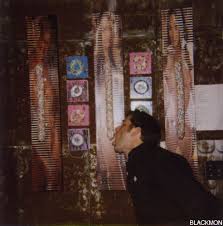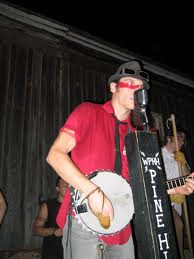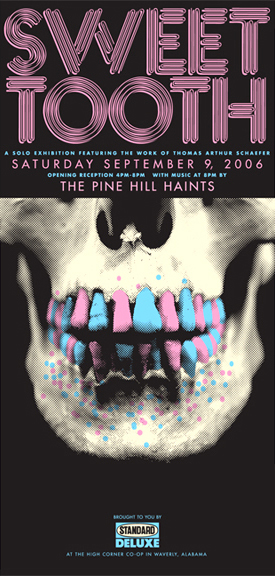Saturday, September 30, 2006
TWITCHINESS
twitch |twi ch | verb 1 give or cause to give a short, sudden jerking or convulsive movement : [ intrans. ] he saw her lips twitch and her eyelids flutter | [ trans. ] the dog twitched his ears. • [ trans. ] cause to move in a specified direction by giving a sharp pull : he twitched a cigarette out of a packet. 2 [ trans. ] apply a sudden pull or jerk to (a horse). noun 1 a short, sudden jerking or convulsive movement : his mouth gave a slight twitch. • a sudden pull or jerk : he gave a twitch at his mustache. • a sudden sharp sensation; a pang : he felt a twitch of annoyance. 2 a stick with a small noose attached to one end. The noose may be twisted around the upper lip or the ear of a horse to subdue it, esp. during veterinary procedures. ORIGIN Middle English : of Germanic origin; related to Old English twiccian [to pluck, pull sharply.]
Friday, September 29, 2006
JITTERINESS
jitter |ˈjitər| informal noun 1 ( jitters) feelings of extreme nervousness : a bout of the jitters. 2 slight irregular movement, variation, or unsteadiness, esp. in an electrical signal or electronic device. verb [ intrans. ] act nervously : an anxious student who jittered at any provocation. • (of a signal or device) suffer from jitter. DERIVATIVES jitteriness |-rēnis| noun jittery adjective ORIGIN 1920s: of unknown origin.
Thursday, September 28, 2006
HEEBIE-JEEBIES
heebie-jeebies |ˈhēbē ˈjēbēz| plural noun ( the heebie-jeebies) informal a state of nervous fear or anxiety : it takes a lot more than a measly poltergeist to give me the heebie-jeebies. ORIGIN 1920s: coined by W. B. DeBeck (1890–1942), American cartoonist, in his comic strip Barney Google.
Wednesday, September 27, 2006
WILLIES
willies |ˈwilēz| plural noun ( the willies) informal a strong feeling of nervous apprehension and discomfort : that room gave him the willies. ORIGIN late 19th cent.(originally U.S.): of unknown origin.willy |ˈwilē| (also willie) noun ( pl. -lies) informal a penis. ORIGIN early 20th cent.: nickname for the given name William.
Tuesday, September 26, 2006
SHIVERS
shiver 1 |ˈ sh ivər| verb [ intrans. ] (of a person or animal) shake slightly and uncontrollably as a result of being cold, frightened, or excited : they shivered in the damp foggy cold. See note at shake . noun a momentary trembling movement : she gave a little shiver as the wind flicked at her bare arms | the way he looked at her sent shivers down her spine. • ( the shivers) a spell or an attack of trembling, typically as a result of fear or horror : a look that gave him the shivers. DERIVATIVES shiverer noun shiveringly adverb shivery |ˈ sh iv(ə)rē| adjective ORIGIN Middle English chivere, perhaps an alteration of dialect chavele [to chatter,] from Old English ceafl [jaw.] shiver 2 noun (usu. shivers) each of the small fragments into which something such as glass is shattered when broken; a splinter. verb [ intrans. ] rare break into such splinters or fragments : the world seemed to shiver into a million splinters of prismatic color. PHRASES shiver my (or me) timbers a mock oath attributed to sailors. ORIGIN Middle English : from a Germanic base meaning ‘to split’ ; related to German Schiefer ‘slate.’
Monday, September 25, 2006
CREEPS
creep |krēp| verb ( past and past part. crept |krept|) [ intrans. ] 1 move slowly and carefully, esp. in order to avoid being heard or noticed : he crept downstairs, hardly making any noise | they were taught how to creep up on an enemy. • (of a thing) move very slowly at an inexorably steady pace : the fog was creeping up from the marsh. • (of a plant) grow along the ground or other surface by means of extending stems or branches : [as adj. ] ( creeping) tufts of fine leaves grow on creeping rhizomes. • (of a plastic solid) undergo gradual deformation under stress. 2 ( creep in/into) (of an unwanted and negative characteristic or fact) occur or develop gradually and almost imperceptibly : errors crept into his game | [as adj. ] ( creeping) the creeping centralization of power. • ( creep up) increase slowly but steadily in number or amount : interest rates have been creeping up in the past few weeks. noun 1 informal a detestable person. • a person who behaves in an obsequious way in the hope of advancement. 2 slow movement, esp. at a steady but almost imperceptible pace : an attempt to prevent this slow creep of costs. • the tendency of a car with automatic transmission to move when in gear without the accelerator being pressed. • the gradual downward movement of disintegrated rock or soil due to gravitational forces : stones and earth slowly slip down the slopes by soil creep. • the gradual deformation of a plastic solid under stress. • gradual bulging of the floor of a mine owing to pressure on the pillars. PHRASES give someone the creeps informal induce a feeling of revulsion or fear in someone. make one's flesh creep feel disgust or revulsion and have a sensation like that of something crawling over the skin. ORIGIN Old English crēopan [move with the body close to the ground,] of Germanic origin; related to Dutch kruipen. Sense 1 of the verb dates from Middle English .
Sunday, September 24, 2006
FOREBODING
foreboding |fôrˈbōdi ng | noun fearful apprehension; a feeling that something bad will happen : with a sense of foreboding she read the note. adjective implying or seeming to imply that something bad is going to happen : when the doctor spoke, his voice was dark and foreboding. See note at ominous . DERIVATIVES forebodingly adverb forebode |fôrˈbōd| verb [ trans. ] archaic or poetic/literary (of a situation or occurrence) act as a warning of (something bad) : this lull foreboded some new assault upon him. • have a presentiment of (something bad) : I foreboded mischief the moment I heard.
Saturday, September 23, 2006
PERTURBATION
perturbation |ˌpərtərˈbā sh ən| noun 1 anxiety; mental uneasiness : she sensed her friend's perturbation. • a cause of such anxiety or uneasiness : Frank's atheism was more than a perturbation to Michael. 2 a deviation of a system, moving object, or process from its regular or normal state of path, caused by an outside influence : some minor perturbation in his house's cash flow. • Physics a slight alteration of a physical system, for example of the electrons in an atom, caused by a secondary influence. • Astronomy a minor deviation in the course of a celestial body, caused by the gravitational attraction of a neighboring body. ORIGIN late Middle English : from Latin perturbatio(n-), from the verb perturbare ‘disturb greatly’ (see perturb ).
Friday, September 22, 2006
NERVES
nerve |nərv| noun 1 (in the body) a whitish fiber or bundle of fibers that transmits impulses of sensation to the brain or spinal cord, and impulses from these to the muscles and organs : the optic nerve. 2 ( nerves) a person's mental state, in particular the extent to which they are agitated or worried : an amazing journey that tested her nerves to the full. • nervousness or anxiety : his first-night nerves soon disappeared. 3 (often one's nerve) a person's steadiness, courage, and sense of purpose when facing a demanding situation : the army's commanders were beginning to lose their nerve | I got up the nerve to ask Miss Kinnian to have dinner with me. See note at courage . • informal impudence or audacity : he had the nerve to insult my cooking | she's got nerve wearing that short skirt with those legs. 4 Botany a prominent unbranched rib in a leaf, esp. in the midrib of the leaf of a moss. verb ( nerve oneself) brace oneself mentally to face a demanding situation : she nerved herself to enter the room. PHRASES a bundle of nerves informal someone who is extremely timid or tense. get on someone's nerves informal irritate or annoy someone. have nerves of steel not be easily upset or frightened. strain every nerve make every possible effort. [ORIGIN: from the earlier sense of nerve as [tendon, sinew.] ] touch (or hit or strike) a nerve (or a raw nerve) provoke a reaction by referring to a sensitive topic : there are signs that some comments strike a raw nerve. war of nerves a struggle in which opponents try to wear each other down by psychological means. DERIVATIVES nerved adjective [usu. in combination ] : she was still raw-nerved from reliving the past. ORIGIN late Middle English (also in the sense [tendon, sinew] ): from Latin nervus; related to Greek neuron ‘nerve’ (see neuron ).
Thursday, September 21, 2006
NERVOUSNESS
nervous |ˈnərvəs| adjective 1 easily agitated or alarmed; tending to be anxious; highly strung : a sensitive, nervous person | these quick, nervous birds. • anxious or apprehensive : staying in the house on her own made her nervous | I was nervous about my new job. • (of a feeling or reaction) resulting from anxiety or anticipation : nervous energy. 2 relating to or affecting the nerves : a nervous disorder. DERIVATIVES nervously adverb nervousness noun ORIGIN late Middle English (in the senses [containing nerves] and [relating to the nerves] ): from Latin nervosus ‘sinewy, vigorous,’ from nervus ‘sinew’ (see nerve ). Sense 1 dates from the mid 18th cent.
Wednesday, September 20, 2006
First... Cast The Beam Out Of Thine Own Eye And Then The Mote From Mine
.jpg)
.jpg)
One of 2 new works-in-progress for an upcoming group show.
Tuesday, September 19, 2006
APPREHENSION
apprehension |ˌapriˈhen sh ən| noun 1 anxiety or fear that something bad or unpleasant will happen : he felt sick with apprehension | she had some apprehensions about the filming. 2 understanding; grasp : the pure apprehension of the work of art. 3 the action of arresting someone : they acted with intent to prevent lawful apprehension. ORIGIN late Middle English (in the sense [learning, acquisition of knowledge] ): from late Latin apprehensio(n-), from apprehendere ‘seize, grasp’ (see apprehend ).
Monday, September 18, 2006
Sunday, September 17, 2006
ANGST
angst |a ng (k)st; ä ng (k)st| noun a feeling of deep anxiety or dread, typically an unfocused one about the human condition or the state of the world in general : adolescent angst. • informal a feeling of persistent worry about something trivial : my hair causes me angst. ORIGIN 1920s: from German, ‘fear, anxiety.’
Saturday, September 16, 2006
WORRY
worry |ˈwərē| verb ( -ries, -ried) 1 [ intrans. ] give way to anxiety or unease; allow one's mind to dwell on difficulty or troubles : he worried about his soldier sons in the war | [with clause ] I began to worry whether I had done the right thing. • [ trans. ] cause to feel anxiety or concern : there was no need to worry her | I've been worrying myself sick over my mother | [ trans. ] he is worried that we are not sustaining high employment | [as adj. ] ( worrying) the level of inflation has improved but remains worrying. • [as adj. ] ( worried) expressing anxiety : there was a worried frown on his face. • [ trans. ] cause annoyance to : the noise never really stops, but it doesn't worry me. 2 [ trans. ] (of a dog or other carnivorous animal) tear at, gnaw on, or drag around with the teeth : I found my dog contentedly worrying a bone. • (of a dog) chase and attack (livestock, esp. sheep). • [ intrans. ] ( worry at) pull at or fiddle with repeatedly : he began to worry at the knot in the cord. noun ( pl. -ries) a state of anxiety and uncertainty over actual or potential problems : her son had been a constant source of worry to her. • a source of anxiety : the idea is to secure peace of mind for people whose greatest worry is fear of attack. PHRASES not to worry informal used to reassure someone by telling them that a situation is not serious : not to worry—no harm done. DERIVATIVES worriedly adverb worrier noun worryingly adverb : [as submodifier ] trade deficits are worryingly large. ORIGIN Old English wyrgan [strangle.] In Middle English the original sense of the verb gave rise to the meaning [seize by the throat and tear,] later figuratively [harass,] whence [cause anxiety to] (early 19th century, the date also of the noun).
Friday, September 15, 2006
ANXIETY
anxiety |a ng ˈzī-itē| noun ( pl. -ties) a feeling of worry, nervousness, or unease, typically about an imminent event or something with an uncertain outcome : he felt a surge of anxiety | anxieties about the moral decline of today's youth. • [ with infinitive ] desire to do something, typically accompanied by unease : the housekeeper's eager anxiety to please. • Psychiatry a nervous disorder characterized by a state of excessive uneasiness and apprehension, typically with compulsive behavior or panic attacks. ORIGIN early 16th cent.: from French anxiété or Latin anxietas, from anxius (see anxious ).
Thursday, September 14, 2006
DISTRESS
distress |disˈtres| noun 1 extreme anxiety, sorrow, or pain : to his distress he saw that she was trembling. • the state of a ship or aircraft when in danger or difficulty and needing help : vessels in distress on or near the coast. • suffering caused by lack of money or the basic necessities of life : the poor were helped in their distress. • Medicine a state of physical strain, exhaustion, or, in particular, breathing difficulty : they said the baby was in distress. 2 Law another term for distraint . verb [ trans. ] cause (someone) anxiety, sorrow, or pain : I didn't mean to distress you | [ trans. ] he was distressed to find that Anna would not talk to him | [as adj. ] ( distressing) some very distressing news. • give (furniture, leather, or clothing) simulated marks of age and wear : the manner in which leather jackets are industrially distressed. DERIVATIVES distressful |-fəl| adjective distressingly adverb ORIGIN Middle English : from Old French destresce (noun), destrecier (verb), based on Latin distringere ‘stretch apart.’
Wednesday, September 13, 2006
DISMAY
dismay |disˈmā| verb [ trans. ] (usu. be dismayed) cause (someone) to feel consternation and distress : they were dismayed by the U-turn in policy. noun consternation and distress, typically that caused by something unexpected : to his dismay, she left him. ORIGIN Middle English : from Old French, based on Latin dis- (expressing negation) + the Germanic base of may 1 .
Tuesday, September 12, 2006
CONSTERNATION
consternation |ˌkänstərˈnā sh ən| noun feelings of anxiety or dismay, typically at something unexpected : I always welcomed clover, much to the consternation of the neighbors. ORIGIN early 17th cent.: from Latin consternatio(n-), from the verb consternare ‘lay prostrate, terrify’ (see consternate ).
Monday, September 11, 2006
DREAD
dread |dred| verb [ trans. ] anticipate with great apprehension or fear : Jane was dreading the party | [with infinitive ] I dread to think what Russell will say. • archaic regard with great awe or reverence. noun 1 great fear or apprehension : the thought of returning to New Jersey filled her with dread | [in sing. ] I used to have a dread of Sunday afternoons. 2 informal a person with dreadlocks. • ( dreads) dreadlocks. adjective [ attrib. ] greatly feared; dreadful : he was stricken with the dread disease and died. • archaic regarded with awe; greatly revered : that dread being we dare oppose. ORIGIN Old English ādrǣdan, ondrǣdan; related to Old High German intrātan.
Sunday, September 10, 2006
Sail With It And Wait For The Sound From Out Of Control Panic
Here's a few of the photos I got off last night at my opening. I was to busy dealing with it all to worry about pictures. I'll post them as they come in from everyone. All-in-all it was a pretty sweet event and the response was really good toward all the work. A hell of a lot of people came out for such a tiny little town.
—
.jpg)
.jpg)
The controvercial R Rated works, the large and three other smaller works were covered in black cloth until their unveiling 9pm.
.jpg)

Rave reviews from the folks.



Kanka checks out the 18" jimmie coated double-ended dildos.
.jpg)

Harris and the ladies out front of the CO-OP.

Kissed by the cook... whose ribs were the shiz'nit.
—



A long shot of the yard as the Haints rocked the CO-OP.
—
.jpg)
.jpg)
The controvercial R Rated works, the large and three other smaller works were covered in black cloth until their unveiling 9pm.
.jpg)

Rave reviews from the folks.



Kanka checks out the 18" jimmie coated double-ended dildos.
.jpg)

Harris and the ladies out front of the CO-OP.

Kissed by the cook... whose ribs were the shiz'nit.
—



A long shot of the yard as the Haints rocked the CO-OP.
Saturday, September 09, 2006
The Opening Of A Box Can Be Dangerous In Most Instances
OPENING RECEPTION TONIGHT

Exhibition poster designed by Matt Lane Harris. Posters are a three color silkscreen on French Construction Black 180lb and measure a sweet 12"x25". Posters are available thru Standard Deluxe for only $15.

Exhibition poster designed by Matt Lane Harris. Posters are a three color silkscreen on French Construction Black 180lb and measure a sweet 12"x25". Posters are available thru Standard Deluxe for only $15.
Friday, September 08, 2006
Wanting To Be Something That I Can Prehaps Be
.jpg)
Afternoon lunch and poster plastering of Auburn with Harris & Acuff
.jpg)
.jpg)
.jpg)
After an 8 hour instalation... I'm finished.
-
Tomorrow night, the opening.
Thursday, September 07, 2006
Blabber Mouthed Children And Thier Parents Notions
.jpg)
The car is loaded down with the work and ready for the drive into Waverly.
.jpg)
A roadtrip treat — a hot coffee for me and two dozen donuts for my habit.
.jpg)
.jpg)
Peek prints up some of the posters for the show at the shop.
.jpg)
Late night party in the park.
Wednesday, September 06, 2006
TREPIDATION
trepidation |ˌtrepiˈdā sh ən| noun 1 a feeling of fear or agitation about something that may happen : the men set off in fear and trepidation. 2 archaic trembling motion. DERIVATIVES trepidatious |- sh əs| adjective ORIGIN late 15th cent.: from Latin trepidatio(n-), from trepidare ‘be agitated, tremble,’ from trepidus ‘alarmed.’
Tuesday, September 05, 2006
AGITATION
agitation |ˌajiˈtā sh ən| noun 1 a state of anxiety or nervous excitement : she was wringing her hands in agitation. • the action of arousing public concern about an issue and pressing for action on it : widespread agitation for social reform. 2 the action of briskly stirring or disturbing something, esp. a liquid. ORIGIN mid 16th cent.(in the sense [action, being active] ): from Latin agitatio(n-), from the verb agitare (see agitate ).
Monday, September 04, 2006
PANIC
panic 1 |ˈpanik| noun sudden uncontrollable fear or anxiety, often causing wildly unthinking behavior : she hit him in panic | [in sing. ] he ran to the library in a blind panic. • widespread financial or commercial apprehension provoking hasty action : he caused an economic panic by his sudden resignation | [as adj. ] panic selling. • informal a frenzied hurry to do something : a workload of constant panics and rush jobs. verb ( -icked , -icking ) [ intrans. ] be affected by panic : the crowd panicked and stampeded for the exit. • [ trans. ] cause to feel panic : talk of love panicked her. DERIVATIVES panicky adjective ORIGIN early 17th cent.: from French panique, from modern Latin panicus, from Greek panikos, from the name of the god Pan , noted for causing terror, to whom woodland noises were attributed.panic 2 (also panic grass) noun any of a number of cereal and fodder grasses related to millet. • Panicum and related genera, family Gramineae.ORIGIN late Middle English : from Latin panicum, from panus ‘ear of millet’ (literally ‘thread wound on a bobbin’ ), based on Greek pēnos ‘web,’ pēnion ‘bobbin.’
Sunday, September 03, 2006
ALARM
alarm |əˈlärm| noun an anxious awareness of danger : the boat tilted and the boatmen cried out in alarm | he views the right-wing upsurge in Europe with alarm. • [in sing. ] a warning of danger : I hammered on several doors to raise the alarm | Oliver smelled smoke and gave the alarm. • a warning sound or device : a burglar alarm. • an alarm clock. verb 1 [ trans. ] cause (someone) to feel frightened, disturbed, or in danger : the government was alarmed by an outbreak of unrest | [as adj. ] ( alarming) children were dying at an alarming rate. 2 ( be alarmed) be fitted or protected with an alarm : this door is locked and alarmed between 11 p.m. and 6 a.m. DERIVATIVES alarmingly adverb ORIGIN late Middle English (as an exclamation meaning [to arms!] ): from Old French alarme, from Italian allarme, from all' arme! ‘to arms!’
Saturday, September 02, 2006
HORROR
horror |ˈhôrər; ˈhär-| noun 1 an intense feeling of fear, shock, or disgust : children screamed in horror. • a thing causing such a feeling : photographs showed the horror of the tragedy | the horrors of civil war. • a literary or film genre concerned with arousing such feelings : [as adj. ] a horror movie. • intense dismay : to her horror she found that a thief had stolen the machine. • [as exclam. ] ( horrors) chiefly humorous used to express dismay : horrors, two buttons were missing! • [in sing. ] intense dislike : many have a horror of consulting a dictionary. • ( the horrors) an attack of extreme nervousness or anxiety : the mere thought of it gives me the horrors. 2 informal a bad or mischievous person, esp. a child : that little horror Zach was around. ORIGIN Middle English : via Old French from Latin horror, from horrere ‘tremble, shudder’ (see horrid ).
Friday, September 01, 2006
FEARFULNESS
fearful |ˈfi(ə)rfəl| adjective 1 feeling afraid; showing fear or anxiety : bond traders have remained fearful of inflation | [with clause ] the mothers were fearful that their daughters would marry and move abroad. • causing or likely to cause people to be afraid; horrifying : a fearful accident. 2 informal very great : he could cause a fearful commotion. DERIVATIVES fearfully adverb fearfulness noun
Subscribe to:
Posts (Atom)
